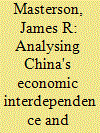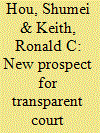|
|
|
Sort Order |
|
|
|
Items / Page
|
|
|
|
|
|
|
| Srl | Item |
| 1 |
ID:
112377


|
|
|
|
|
| Publication |
2012.
|
| Summary/Abstract |
This study examines the effects that economic interdependence has on political relations between China and its neighbours. Three economic liberal hypotheses are tested using data from the International Cooperation and Regional Conflicts dataset to measure dyadic political interaction along with economic data from the IMF and China Statistical Yearbooks and control variable data from Polity IV, COW CINC, among other sources. Though a significant amount of literature addresses the effects trade has on conflict at the systemic level, few studies address it at the dyadic level and even fewer test the pacification of trade on non-Western states. Examining economic, political, institutional, geographical, and political relations data from 1987 to 2001, this research tests the economic liberal hypothesis which posits that interdependence is associated with cooperative political relations between states. The findings show that trade interdependence is generally associated with political cooperation. However, the realist contention that relative power increases are associated with political conflict is also supported and analysed further.
|
|
|
|
|
|
|
|
|
|
|
|
|
|
|
|
| 2 |
ID:
112380


|
|
|
|
|
| Publication |
2012.
|
| Summary/Abstract |
This article focuses on a specific aspect of Yu Hua's satiric criticism of Mao-era rhetoric through the use of double-voiced discourse in his full-length novel Cries in the Drizzle. I analyse how this double-voiced discourse is achieved through the contrast between the focalizers' unreflective and matter-of-fact use of Maoist rhetoric and the public narrator's clear awareness of the shabby realities behind this rhetoric. The varied understandings of Maoist rhetoric within a variety of narrative voices give rise to sarcasm, irony, and parody. Four episodes in Cries in the Drizzle will be analysed in detail. In each of these, Mao-era rhetoric is projected and embedded in the daily conversations and language of some characters who hail from villages in the countryside. These episodes invite readers to reflect upon just how much of the daily discourse of the Chinese people alludes to, or incorporates, the words of Mao and the Party, and also to appreciate the varied forms of double-voiced discourse brought about by differentiated perspectives of the public narrator versus the focalizers in Yu Hua's story.
|
|
|
|
|
|
|
|
|
|
|
|
|
|
|
|
| 3 |
ID:
112379


|
|
|
|
|
| Publication |
2012.
|
| Summary/Abstract |
This article focuses on the understudied area of Internet-facilitated judicial transparency and its implications for the right to know, the citizen's engagement with China's court system, and the related development of competent legal reasoning. The analytical focus is on recent China Supreme People's Court regulations bolstering open reporting on court websites. This article explores the scope and quality of this reform, comparing it with earlier 'open trial' initiatives and investigating its origins and its contemporary implications, both in terms of generating public confidence in fair trial and furthering the development of legal education inside and outside of the legal system. The Internet may help to circulate an improved legal reasoning within the judiciary as well as support a more informed public understanding of the law's requirements. Openness may pressure judges into a wider process of research and learning as they are more exposed to public scrutiny. At the same time it may well expose the extant level of legal incompetence in China's new legal system.
|
|
|
|
|
|
|
|
|
|
|
|
|
|
|
|
| 4 |
ID:
112378


|
|
|
|
|
| Publication |
2012.
|
| Summary/Abstract |
Despite recent legislation and regulations to protect homeowners' rights in the process of urbanization, forced eviction remains one of the most prevalent causes of violence in contemporary China. This article examines the capacity of residents of Chinese cities to protect their property rights using new media to produce alternative discourses on law in the urbanization process. Fieldwork conducted in Beijing from 2007 to 2008, a period during which the national capital underwent massive development schemes for the 2008 Summer Olympic Games, shows that homeowners create virtual precedents, backed not by the authority of the court, but by that of the media. Evictees of so-called dingzihu (nail-houses) facing chaiqian (demolition and relocation) develop arguments based on the 2007 case of Wu Ping, the first new media superstar in (post-)socialist China. The article, following post-structuralist formulations, develops a theory of 'legal surrealism' characteristic of the position of law in reform-era China. Whereas social media is equated with revolution elsewhere, in China, the lesson of the role of new media in effecting social change may be one of limitation. While digital mass communication technologies may assist individual 'victories', challenges to eviction face both intrinsic and extrinsic obstacles for collective action.
|
|
|
|
|
|
|
|
|
|
|
|
|
|
|
|
|
|
|
|
|